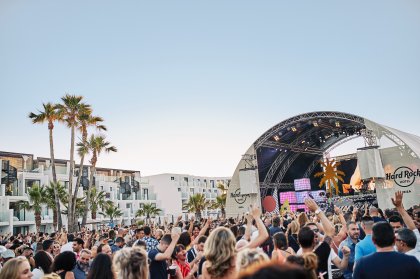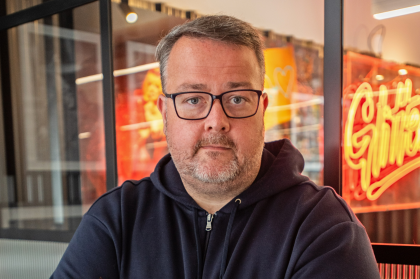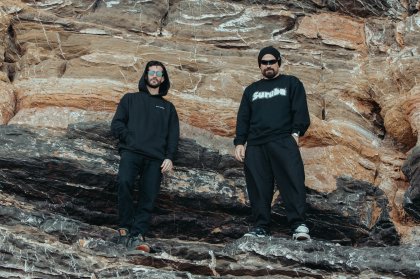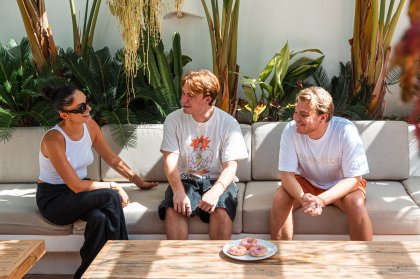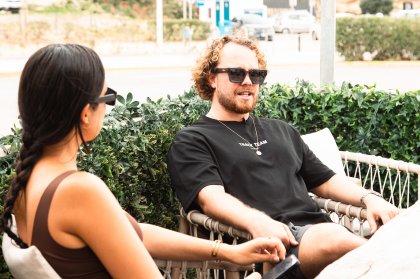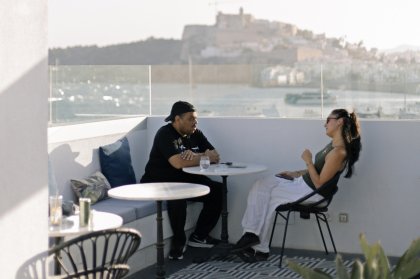I sit down with Stimming at 2016's International Music Summit, where he's due to play a live set at the Hard Rock Hotel the same evening. We find a spot amid the hustle and bustle of the conference; his considered demeanour a direct contrast to the frenzied goings on that surround us. He's due on stage in less than an hour but he's calm, collected and full of musings - you get the impression you're only delving just beneath the surface when he answers a question. We're here to talk about - among other things - Alpe Lusia, his fourth artist album, and the result of a month of solitude spent in the Italian Alps. Over the course of our conversation we touch on silence, cheesy tunes and the making of this new LP, in which he pushed himself beyond the limits of most artists.
You recorded Alpe Lusia in secluded wilderness. What was behind that decision?
"The concept was to not get distracted by society - internet, people, cities, noise. Noise mostly. The idea was to go to an abandoned cabin in the middle of nowhere, so why not in a mountain with a beautiful view? I was completely alone. I brought the core pieces of my studio with me, and that was it."
Is there a meaning behind the title?
"I really need to look it up, actually. As far as I know, lusia means light, and the Alps are full of Alpe - that's like the back of a mountain that can be used for cows and sheep and that kind of stuff. It's an economic area inside the mountains. There are thousands of them, and I was at the Alpe Lusia."
What was it like being alone for a month? How did you cope with the silence?
"Well, interestingly, it wasn't that silent, because the cows wear cow bells. So all the time, it was like, ringalingaling!"
Did you use one as a sample? You do have a history of using strange ones on your tracks!
"Yeah, of course! It was all the time at night, seriously. And then I recognised how many planes fly above the Alps - it's quite a lot - so it's not that silent. What was really interesting for me was to not smell anything. We're so used to strong smells - like perfumes and cars. The city has a trillion smells and there were none of them in the mountains. When I came back into society, I was quite overwhelmed by it."
What was it like to be alone for that period of time?
"It was a form of escape with a specific purpose to focus on making music - and that was the trick. Without the music equipment, I would have gone mad."
So how did that translate onto the album, what can we expect?
"I'm going to play a live set without a laptop. So it's going to be all hardware - that doesn't mean it's not analogue, but there's no machine with an apple on stage. It's all part of my two-phase plan. Phase one was to make a new album; phase two was to play a live set without a laptop. I'll play long samples from the albums with a drum machine, a synth, and everything going through a TC Finalizer, and that's it."
Does the album hold emotional attachment for you - how do you convert your emotions into sound?
"Basically that's the biggest strength of music in general - so actually I'm just using the strength of music. And I don't really find it difficult because generally I'm quite an open person - so I'm not afraid of showing it because I know that people feel the same, or at least I know some people feel the same. So it's kind of like a mirror, or reading a good book when you feel close to the main person in it. That's what I want to do with my music."
Does it become like a form of therapy then?
"Not anymore. It was like that for a long time but now it's just art. The creation is in the emotions I create for others."
What's changed?
"In my mid-20s I think I was frustrated - about everything. There's always this ‘why' when you're that age. Or the option to go down one of two roads."
What track on the LP do you have the strongest emotional connection with?
"There's this one where I allowed myself to make something very cheesy; it's called ‘For My Better Half'. It's the only track with a vocal in it and it was pretty simple - it's basically just about how much I missed her; my other half. I missed her a lot. Interesting for me was to try and find a way to make it so that it wasn't too cheap. Hopefully I pushed it to a point in the emotional sphere that meant it wasn't cheesy."
How would you define cheesy?
"Missing someone is one of the most obvious emotions humans can feel. It's like the main topic in popular music - that and love. It's so prevalent that actually it kind of gets on my nerves. Musicians obviously can't talk about anything other than love and heartbreak; it's so boring when you turn on the radio. Even if you're in a relationship for a long time you can't be constantly in love - how can you be? It's a beautiful feeling, but still."
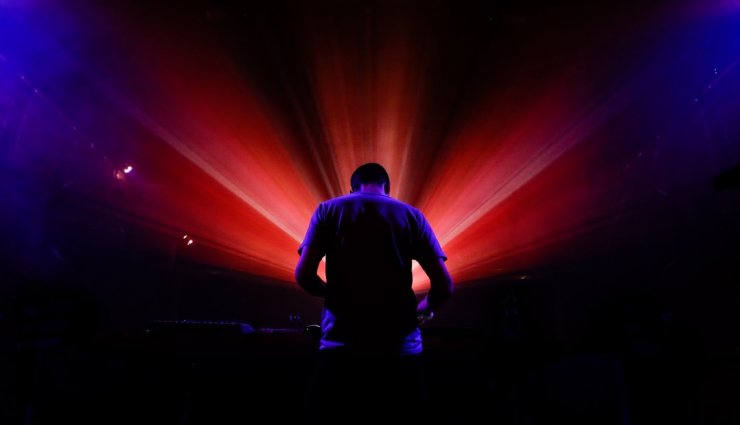
What did your girlfriend think about you disappearing in to the mountains?
"For her it was okay because she experienced the whole process of me deciding to go. She looked me in the eyes when I told her and knew I had to do it."
She obviously knows you like to challenge yourself - was that what this project was about?
"The interesting thing with this topic is that in the making process, it's about technical decisions - the listener doesn't realise that. The inconvenience of not using pushy pushy blinky blinky machines, is one of those decisions that brought me to trouble at first, but in the end gave me much more satisfaction because it was difficult. I suppose going alone to the Alps for a month is also a challenge. I took on a second one as well - I went on a container ship for a week to practice this live set - which was clever,actually, because two weeks would have been too much. It went from Bremerhaven to Helsingborg to Göteborg to Rotterdam and back to Bremerhaven. It was January and I was the only passenger on the whole container ship. It helped because on the one hand it gave me a deadline - because when I was on the ship I couldn't do anything new with the album - and it also allowed me to practice the live set in difficult circumstances. It wasn't easy!"
That doesn't necessarily sound like an enjoyable experience!
"Well, I woke up during the night a couple of times because I'd rolled from one side of the room to another, and I couldn't even stabilise myself because it was so rough."
Is it fair to say you like to push your own limits in every aspect of life?
"I think I made a transition from not doing that in nonsense areas anymore, but in making it in real life areas. To be honest, it's mostly just music, but that's quite enough."
Do you think that came from a young age, and that partly explains your musical prowess?
"I started with the violin when I was very young - although I'm pretty sure I never got one nice tone from it. And then pretty fast I moved onto the piano and drums. It's a clever decision for parents to teach their children how to play an instrument because it trains the brain. I was naturally good at it - I wasn't that much into practicing and learning pieces that older musicians had already made, but I was very interested in making my own music right from the beginning."
What other live artists are you impressed by?
"Actually, I don't know one. Because I don't follow anything - I don't care. I don't DJ, I don't listen to what's going on, I just hear it when I'm playing a gig and people are on before me. I like that KiNK is doing things spontaneously because that's the best thing about playing live - it's hugely different to a DJ set. Playing the bassline with your hands is what's on the musician side."
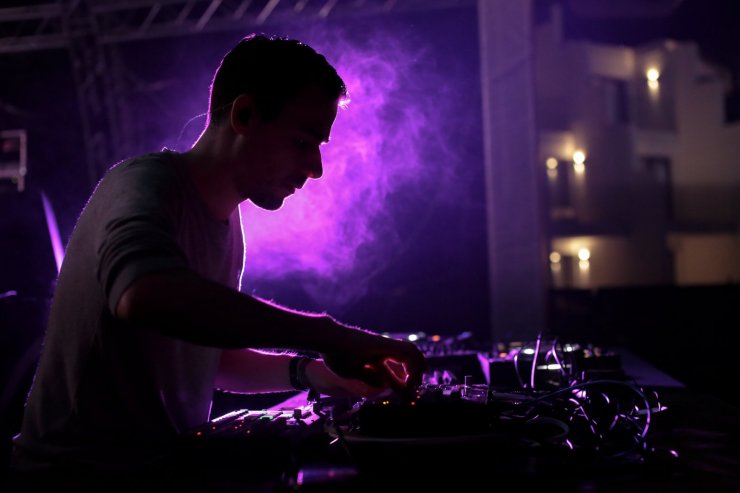
Does every performance vary for you?
"It's always different - I have two or three tracks that I know fit very well together, but on the whole if I don't do things spontaneously it's because I don't feel comfortable. For example, I'm going to play the Diynamic festival in Amsterdam, and the main stage is in front of 6,000 people, so you can't do too many tricks in front of that kind of audience - it's too dangerous. You could fuck it up. I get intimidated even by small audiences. With the set-up being more complicated than before, it's really a challenge. With the new set-up, the play and the stop button are one inch away from each other. On Ableton Live, there isn't even a stop button anymore, you can't stop it. But it's not terrifying because it's just an instrument - on a guitar you can also be very close to playing the wrong note. What I love so much is that I see a progression every time I play."
So what's next?
"Playing and playing and playing. And I'm going to become a father in two months - probably this will be the biggest push I'll ever have. I've allowed myself three weeks off and then maybe I'll take a longer break next year. I might play a few 4D shows in Budapest this year and next year, we'll see."
And finally, if you had to listen to one track every day for the rest of your life, what would it be?
"Maybe one from Brain Eno! Or DJ Krush. I don't know the track name, but it's track number seven on his latest album. [Butterfly Effect, ‘Missing Link']."
WORDS | Abby Lowe PHOTOGRAPHY | James Chapman
